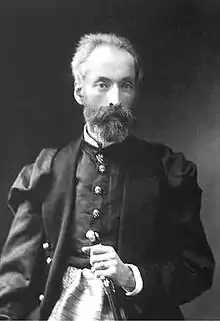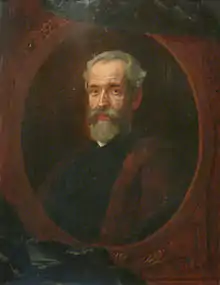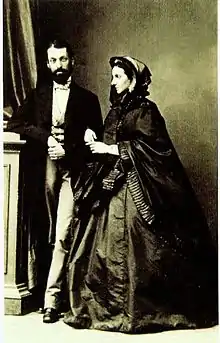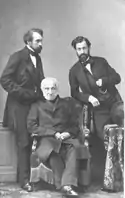Władysław Czartoryski
Prince Władysław (Ladislaus) Czartoryski (3 July 1828 – 23 June 1894) was a Polish noble, political activist in exile, collector of art, and founder of the Czartoryski Museum in Kraków.
Władysław Czartoryski | |
|---|---|
 Prince Władysław Czartoryski | |
| Coat of arms | Czartoryski coat of arms |
| Born | 3 July 1828 Warsaw, Congress Poland |
| Died | 23 June 1894 (aged 65) Boulogne-Billancourt, France |
| Noble family | Czartoryski |
| Spouse(s) | María Amparo Muñoz, 1st Countess of Vista Alegre Princess Marguerite Adelaide of Orléans |
| Issue
with María Amparo: August Czartoryski with Marguerite Adelaide: Adam Ludwik Czartoryski Witold Kazimierz Czartoryski | |
| Father | Adam Jerzy Czartoryski |
| Mother | Anna Zofia Sapieha |
Life
Son of Prince Adam Jerzy Czartoryski and Princess Anna Zofia Sapieha, he married María Amparo Muñoz, 1st Countess of Vista Alegre, daughter of Queen Maria Christina of Spain by morganatic marriage to Agustín Fernando Muñoz, Duke of Riánsares, on 1 March 1855 in Malmaison near Paris.
Their son August Czartoryski contracted tuberculosis at the age of six from his mother, who died soon thereafter. August (known as "Gucio") had as a tutor Joseph (later Saint Raphael) Kalinowski. Władysław hoped that his son would pursue a diplomatic career, but Gucio went against his father's wishes and joined the religious order of the Salesians. Gucio was ordained a priest in 1893, but neither his father nor anyone else in the family attended the ceremony, and he died a year later of tuberculosis at the age of 34. Gucio was beatified in 2004'.

On 15 January 1872 Prince Władysław married his second wife, Princess Marguerite Adelaide of Orléans, daughter of the Duke of Nemours and granddaughter of King Louis-Philippe of France, with whom he had two more sons, in 1872 (Adam Ludwik Czartoryski) and 1876.
Prince Władysław was an activist of the Hotel Lambert. From 1863-1864 he was the main diplomatic agent of the revolutionary National Government (Rząd Narodowy) with the English, Italian, Swedish and Turkish governments.
He was also owner of the family's outstanding collection of art: paintings, sculptures and antiquities. He was greatly interested in Egyptian art, making his purchases at sales in Paris and directly in Egypt. He donated some objects to the Polish Library in Paris and also other archeological artifacts to the Jagellonian University. In 1871, he donated objects to the Polish Museum in Rapperswil, Switzerland.
In 1865 he organized an exhibition of the "Czartoryski Collection" in the "Polish Room" of the Exposition des Arts Decoratifs in Paris.
In 1878 he reopened the Czartoryski Museum in Kraków, founded by his grandmother Izabela Czartoryska in 1801 in Puławy but closed after the November Uprising. He died in Boulogne-sur-Seine and was buried in the Sieniawa family crypt.
See also
Gallery
 Władysław Czartoryski with his wife María Amparo Muñoz, 1st Countess of Vista Alegre
Władysław Czartoryski with his wife María Amparo Muñoz, 1st Countess of Vista Alegre Władysław Czartoryski (right) with his brother (left) and father (seated), Adam Jerzy Czartoryski
Władysław Czartoryski (right) with his brother (left) and father (seated), Adam Jerzy Czartoryski
